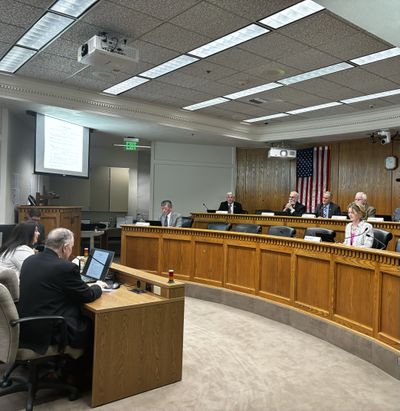‘Ditch the switch’: Washington could move to Pacific Standard Time year-round

If a bill pushed by Sen. Mike Padden, R-Spokane Valley, passes the Legislature, the state would give up its late summer nights for dawns that begin lighting the eastern sky just after 3 a.m. in June.
Padden’s bill would put Washington on Pacific Standard Time permanently if Congress does not act on a previous law pushing for daylight saving time by November. Standard time begins every November when residents change their clocks to “fall back” an hour.
“What we want to do is ditch the switch; we’re tired of that switch, and I’d like to go to a new standard,” Padden said before the Senate State Government and Elections Committee on Tuesday.
Padden’s pitch is familiar to the Legislature, which passed a law in 2019 to remain on daylight saving time indefinitely. However, without Congress’s approval, federal law only permits states to implement standard time year-round. Hawaii and most of Arizona are currently alone in their choice to stay on standard time.
It’s now been four years, and people are tired of waiting, said sponsor Sen. Manka Dhingra, D-Redmond. Within those four years, 19 states have followed suit, authorizing daylight saving time all year if Congress allows.
“Our U.S. Senator Patty Murray and Senator Marco Rubio from Florida have pushed that in 2022 through the U.S. Senate, but the House has not acted and from all indications has no intention of acting in the foreseeable future,” Padden said.
If passed into law, Washington would stay on standard time beginning Nov. 4. That means during the longest day of the year in Spokane, June 20, 2025, it would start to get light around 3:11 a.m. and the sun would fully rise at 3:52 a.m. The sun would set at 7:51 p.m. instead of usually around 8:51 p.m.
If Congress approves year-round daylight saving time, even after standard time is implemented, Washington would then backtrack switching to daylight saving time, Padden told The Spokesman-Review.
Padden said he’s been working with legislators in Oregon, California, Nevada and Idaho to try to implement the same time zone across the neighboring states.
Changing clocks twice a year can have detrimental health effects, and most Americans don’t want to switch their clocks twice a year, as a Monmouth University poll found that two-thirds of Americans want to get rid of the switch.
“Studies have shown that lethargy, distracted driving and health impacts persist for up to a week after the switch,” said Peter Godlewski, government affairs director at the Association of Washington Business.
Within the week after the time change, research shows the risk of heart attack rose 24%, fatal car accidents increased to 6%, stroke rates climbed to 8% and depressive episodes rose 11%, according to Northwestern Medicine.
Horacio de la Iglesia, a researcher specifically focused on circadian rhythms and a UW biology professor, said since people use the sun to align their sleep and activity schedules, standard time is the natural biological clock for humans .
“This is particularly true for young people and adolescents who have a delayed circadian clock and therefore struggle to get out of bed every morning,” de la Iglesia said.
“Bright light, especially in the evening makes us much more of a night owl, makes it very hard to awaken in the morning. Bright light in the morning does the opposite,” said Richard Simon, a retired physician specializing in sleep medicine.
People tend to blame teenagers’ habits of staying up late on technology, but the biological clock changes throughout life, Simon said. Since bright light helps wake people up, daylight saving time hurts the younger generation by making it harder for them to get up for school or work because it is still dark out.